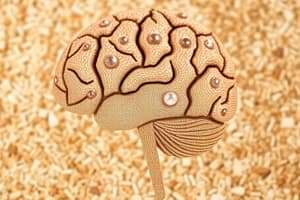Podcast
Questions and Answers
What does Spearman's General Intelligence (g) suggest?
What does Spearman's General Intelligence (g) suggest?
- Only verbal skills are considered intelligence.
- A single basic intelligence predicts abilities across various areas. (correct)
- Intelligence cannot be measured.
- There are multiple independent intelligences.
What are the 7 factors of Thurstone's Primary Mental Abilities?
What are the 7 factors of Thurstone's Primary Mental Abilities?
Verbal comprehension, verbal fluency, number facility, spatial visualization, associative memory, perceptual speed, reasoning.
Gardner's Multiple Intelligences includes traditional academic skills only.
Gardner's Multiple Intelligences includes traditional academic skills only.
False (B)
What are the three areas in Sternberg's Triarchic Theory of Intelligence?
What are the three areas in Sternberg's Triarchic Theory of Intelligence?
Which intelligence is defined by well-defined problems with a single right answer?
Which intelligence is defined by well-defined problems with a single right answer?
What does Creative Intelligence involve?
What does Creative Intelligence involve?
What is Practical Intelligence required for?
What is Practical Intelligence required for?
What is Crystallized Intelligence?
What is Crystallized Intelligence?
What characterizes Fluid Intelligence?
What characterizes Fluid Intelligence?
Flashcards are hidden until you start studying
Study Notes
Theories of Intelligence
-
Spearman's General Intelligence (g)
- Proposes that a singular intelligence (g) influences performance across various academic domains.
- Noted for correlating different abilities, indicating some common cognitive strength.
- Criticized for oversimplifying by trying to encapsulate diverse human abilities into one factor.
-
Thurstone's Primary Mental Abilities
- Intelligence is divided into seven distinct factors, offering a more nuanced understanding than a single g score.
- Strength lies in its detailed breakdown of mental capabilities.
- However, the factors often cluster, suggesting the presence of an overarching g factor.
-
Gardner's Multiple Intelligences
- Identifies eight independent intelligences, extending beyond traditional metrics like verbal and mathematical skills.
- Emphasizes the idea that intelligence encompasses a wide array of skills and talents.
- Critiqued for labeling some abilities as intelligence which may be better classified as skills.
-
Sternberg's Triarchic Theory of Intelligence
- Classifies intelligence into three interconnected areas: analytical, creative, and practical, relevant for real-life success.
- Each type can be measured reliably, providing a comprehensive view of cognitive capabilities.
- Weaknesses include the overlap of these intelligences with the general intelligence factor and the need for more research on their independent measurement.
Types of Intelligence
-
Analytical Intelligence
- Involves solving well-defined problems with a clear, correct answer.
- Typically assessed through traditional intelligence tests, often equated with "book smarts."
-
Creative Intelligence
- Focuses on the ability to react adaptively to new situations and formulate original ideas.
-
Practical Intelligence
- Essential for navigating everyday tasks that require multiple solutions.
- Considered the most challenging type of intelligence to assess universally.
-
Crystallized Intelligence
- Refers to the accumulation of knowledge and verbal skills over time.
- Tends to increase with age, reflecting experiences and education.
-
Fluid Intelligence
- Pertains to the capacity for abstract reasoning and problem-solving without reliance on prior knowledge.
- Begins to diminish in early adulthood, typically in the 20s and 30s.
Studying That Suits You
Use AI to generate personalized quizzes and flashcards to suit your learning preferences.




